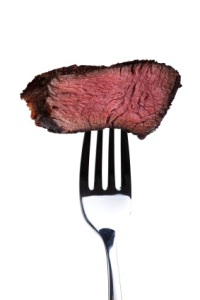As a food blogger, I understand the responsibility I have to my readers. It’s my personal conviction that I should always provide them with the most honest and straight forward information I can. But when it comes to diet advice, some states don’t leave it up to personal conviction; such is the case in North Carolina where a dispute over the advice a blogger was giving his readers came into question. As a result, it’s raised a firestorm of controversy over whether “censorship” is an issue of free speech or a state simply protecting the health of its citizens. 
Steve Cooksey is a blogger who used to be overweight and diabetic, but changed his health and his life by following the paleo diet – a diet that mimics the eating habits of our earliest hunter-gatherer ancestors who primarily subsisted on meat, vegetables and fruit. This means no grains and no dairy, because it wasn’t available then and paleo proponents believe we don’t need it now, nor that it is healthy for our bodies.
Because of Cooksey’s dramatic transformation following the paleo diet, it’s understandable that he was enthusiastic about sharing his newly-found successful diet on his blog, Diabetes-Warrior.net – “Diabetes Management from a Paleolithic Perspective.” And whether he expected it or not, his readership blossomed as people began flocking to his site to learn more about his journey.
On his website, Cooksey writes “To summarize my story, I was an obese, sedentary, recently diagnosed diabetic when I began this journey. I was on diabetes, cholesterol, and hypertension drugs as well as taking 4 insulin shots per day. But within days things began to change and within months I was a new person.”
Cooksey documented his health changes on his site, including his drop in weight from 235 pounds to 165 pounds; going from four daily insulin shots to none and overcoming acid reflux and Plantar Fasciitis, which now allows him to run barefoot outside and rarely wear shoes around his home.
With such dramatic results, it’s no wonder Cooksey’s story has become of such high interest to his readers, especially considering more than 26 million Americans are currently affected by diabetes and he claims to have the solution.
But after the North Carolina Board of Dietetics/Nutrition (NCBDN) – which assumes the duty to “protect the health, safety and welfare of the citizens from harmful nutrition practice…” – received a complaint about Cooksey’s site, they investigated. And though the interaction between the two parties seems unclear at this point, Cooksey did end up adding a disclaimer to his website that states:
“I am not a doctor, dietitian nor nutritionist…in fact I have no medical training of any kind. If I can figure this out so should they…if it wasn’t for their a) intellectual laziness, b) willful ignorance, c) greed, or d) all of the above.”
This biting statement clearly expresses what Cooksey thinks of the NCBDN’s requests to modify his website for the safety of its citizens. And though he complied in slight with the addition of this disclaimer, he’s biting back hard in the form of a First Amendment lawsuit.
 A statement from Cooksey’s lawers regarding the lawsuit was published in The New York Times, which stated: “Cooksey’s advice ultimately amounts to recommendations about what to buy at the grocery store – more steaks and avocados and less pasta, for example. The First Amendment simply does not allow North Carolina to criminalize something as commonplace as advice about diet.”
A statement from Cooksey’s lawers regarding the lawsuit was published in The New York Times, which stated: “Cooksey’s advice ultimately amounts to recommendations about what to buy at the grocery store – more steaks and avocados and less pasta, for example. The First Amendment simply does not allow North Carolina to criminalize something as commonplace as advice about diet.”
But the NBCD contends that Cooksey was doing more than just writing a blog about his beliefs and eating habits; they contest that he was assessing and counseling, which requires a license, and that the supposed ‘paid-life coaching’ he was doing was unlawful.
The lawsuit has been filed, the NBCD has issued a statement on their website to try and clear the air, and Cooksey is still blogging. As for now, the fate of this case is up in the air. For other bloggers, this sends a strong warning message: Be careful what you blog – somebody’s probably watching.
For bloggers who may have concerns about whether or not their content may be in violation of their state’s individual laws, the answer may be as simple as contacting their state to see where they draw the line on regulations. Each state decides which issues to regulate and how involving things like nutrition and medical advice, and dental practices, etc.
In short: if you’re a blogger, ensure the information you share on your site is within your state’s regulations. Doing so could save you a lot of headache and potential legal trouble in the long run.
Also Read:
Sketcher’s Lawsuit: How to Get Your Refund
source: NPR
